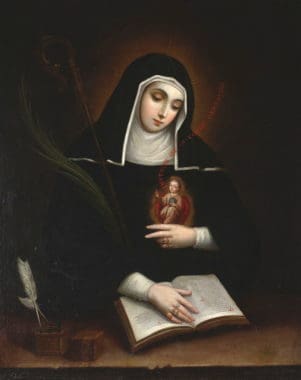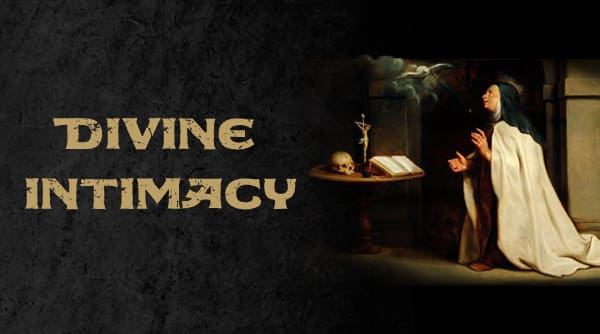Correspondence to Vocation
Presence of God – O Lord, You call me unceasingly, drawing me to Yourself; grant that I may respond to Your call with ever-increasing generosity.
MEDITATION
God calls us but He does not constrain us. He grants man full liberty to accept or to refuse His divine invitation. “If thou wilt be perfect … come, follow Me” (Matthew 19:21), says the Lord to every soul that He chooses, but as with the young man in the Gospel, He leaves to each soul the responsibility of answering or rejecting His call. However, when God calls us, it would be rash to close our heart to His voice and spurn His invitation. Who would dare turn away from the glance of predilection which the Most High casts on one whom He calls to follow Him?
We ought to answer God’s call with great humility and joy, with gratitude and readiness, saying with all our heart, Ecce venio, “Behold, I come … that I should do Thy will, O God” (Hebrews 10:7). The creature should respond to God’s eternal choice of its soul, by choosing God to be its only good, its only love, by rising above all creatures and earthly affections. “He that loveth father or mother more than Me, is not worthy of Me” (Matthew 10:37). God, our Creator and absolute Ruler, has the full right to ask of us the renunciation of even the holiest affections and to exact that, for love of Him, we abandon father and mother, brothers and sisters, home, and all our possessions. Furthermore, if God has decreed that “a man shall leave father and mother and shall cleave to his wife” (Genesis 2:24), would it be extravagant to do the same thing when we give ourselves, not to another creature, but to the Creator Himself?
The first duty one who has received the divine call, is therefore to renounce all earthly affections, possessions, and joys, so that freed from all ties, he may follow the Lord. Actually, what is to be given up will not be the same for all; more is required of the religious than of the secular priest, of the nun than of a person consecrated to God in the world. But from the point of view of affection, the renunciation, or rather the detachment of the heart, must be the same for all; it attains its full measure when it is complete, with no reservation.
COLLOQUY
 “My love holdeth Thee, O loving Jesus, nor will I let Thee go. O Love, who art Life, Thou art also the living Word of God; kindle anew Thy life within me; make amends for all the losses my love has suffered. O God who art love, who hast created me, create me anew in love. O Love who hast redeemed me, redeem and give back to me all that I have lost of Thy love through my negligence. O Love who hast purchased me for Thyself with Thy precious Blood, sanctify me in charity. O God who art Love, who hast adopted me as Thy child, train and fashion me according to Thine own heart. O Love, who hast chosen me for Thyself, and not for another, grant that I may be wholly Thine, Thine alone. O God who art Love, Thou hast loved me freely, gratuitously; grant that I may love Thee with all my heart, with all my soul, with all my strength.
“My love holdeth Thee, O loving Jesus, nor will I let Thee go. O Love, who art Life, Thou art also the living Word of God; kindle anew Thy life within me; make amends for all the losses my love has suffered. O God who art love, who hast created me, create me anew in love. O Love who hast redeemed me, redeem and give back to me all that I have lost of Thy love through my negligence. O Love who hast purchased me for Thyself with Thy precious Blood, sanctify me in charity. O God who art Love, who hast adopted me as Thy child, train and fashion me according to Thine own heart. O Love, who hast chosen me for Thyself, and not for another, grant that I may be wholly Thine, Thine alone. O God who art Love, Thou hast loved me freely, gratuitously; grant that I may love Thee with all my heart, with all my soul, with all my strength.
“O Jesus, my Brother and my Spouse, supreme King, set Thy mark on the face of my soul, and engrave it so deeply, that no creature may attract my choice, nor excite my desire, nor possess my love. Thou art dearer to me than all that is dearest; deign that I may ever be Thy true and faithful spouse in that love which is stronger than death.
“O Love, Thou art dear to me above all things; oh, let Thy love teach me always to be faithful to my promises.
“Grant that I may have a place among the wise virgins. There will I await the heavenly Bridegroom, having my lamp lighted and filled with oil. So I shall not be confounded at the sudden coming of my King; but all peaceful and clothed with light, I shall join with songs of gladness the choirs of virgins who have gone before me. O Lamb without spot, grant that I may not be excluded with the foolish virgins, but in humble confidence, may enter the banquet hall of the great King, where in virtue of my patient and persevering fidelity, I shall dwell forever with the heavenly Lamb” (St. Gertrude).
+
 Note from Dan: This post on correspondence to vocation is provided courtesy of Baronius Press and contains one of two meditations for the day. If you would like to get the full meditation from one of the best daily meditation works ever compiled, you can learn more here: Divine Intimacy. Please honor those who support us by purchasing and promoting their products.
Note from Dan: This post on correspondence to vocation is provided courtesy of Baronius Press and contains one of two meditations for the day. If you would like to get the full meditation from one of the best daily meditation works ever compiled, you can learn more here: Divine Intimacy. Please honor those who support us by purchasing and promoting their products.
Art for this post on correspondence to vocation: Saint Gertrude, Miguel Cabrera, 1763, PD-US author’s life plus 100 years or less, Wikimedia Commons. Father Gabriel of St. Mary Magdalen, mirror from open source material.





